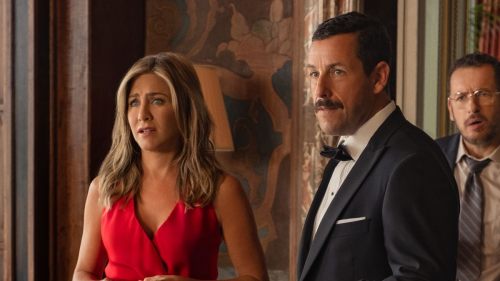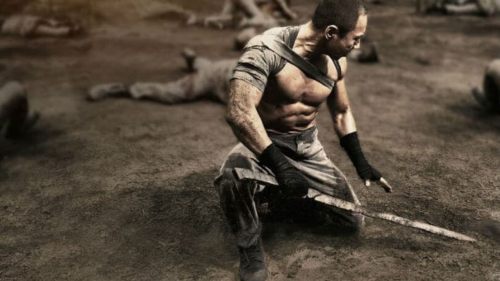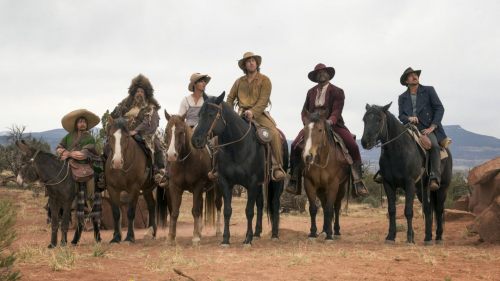EVERTHING SUCKS! Isn’t Perfect, But It Certainly Doesn’t Suck
Everything Sucks! has a bit of a lackluster start. '90s rock plays while a group of 14-year-old nerd boys roll up (on – shocker – bikes) to their first session of AV club freshman year. Luke (Jahi Di’Allo Winston), our protagonist, notices the principal’s daughter, Kate (Peyton Kennedy), and immediately falls head over heels. Later in the cafeteria, they all watch an explosive scene from the drama club’s villainous power couple, Emaline (Sydney Sweeney) and Oliver (Elijah Stevenson).
It seems like pretty standard fare. For anyone who wasn’t a teenager in the '90s and dodges the grip of the nostalgia, the references fall a bit flat. (And why is it always nerd boys? Where are my nerdy girls playing Dungeons & Dragons and goofing off in the woods?) But the way that Kate gazes at Emaline, the queen of the drama club, clues me in that something outside the typical '90s teen comedy might be happening here.
By the end of the first episode, Luke is planning to ask Kate out, and we can already see everything hurtling toward disaster – because Kate isn’t interested in him. Or in boys at all. On top of this, Kate’s dad, Ken (Patch Darragh) strikes up a romance with Luke’s mom, Sherry (Claudine Mboligikpelani Nako).
A (slightly forced) feud unfolds between the AV club and the drama club when Luke and Kate ruin the set for Uncle Vanya, and Luke proposes a solution: he’ll direct an alien movie starring the drama kids. A tenuous peace is struck between the two camps. As the show unfolds, the cliques begin to shift as unlikely characters get closer to one another.
Everything Sucks! is at its weakest when it uses '90s references and teen comedy tropes as a crutch (although the show did make me forget, for about three minutes, that ‘Wonderwall’ was a meme, which is kind of an incredible feat). Luke’s two friends are charming, but their characters never progress much farther than an uber-nerd (Rio Mangini) and Ace Ventura references (Quinn Liebling). When it focuses in on the O’Neils and the Messners, and the relationships in play among the four of them, it does some of its best work.
Kate’s story in particular is the most compelling of the series. A young girl wrestling with her sexuality and realizing that she’s gay in a world where she doesn’t have the language for it is, by far, the show’s best use of its setting. Yes, video editing was arduous and cell phones weren’t around and the Internet barely existed; there’s a scene where a few characters are waiting for “the net” to load that’s played for laughs. But Kate, as a young lesbian, is desperate for context about the way that she feels and totally lacking in access to information. In episode five, Luke reads Kate a sexuality quiz from a hopelessly outdated book, and her confusion is equal to his delight that she must not actually be gay.
And it’s not all struggle; she gets so many tenderly rendered moments of realization, like when she watches a couple at a Tori Amos concert and her eyes well with tears. I do wonder that a show that focuses in so closely on sexuality in the '90s has nothing to say about Luke’s race, but I’ll let someone better versed in this than me dig into that more deeply.
The tension between Luke and Kate is sometimes painful, but it’s the best part of the show. They fight, and they make mistakes, and they offer up small and large gestures to one another in order to make things right again. They grow, and watching their uneven relationship turn into a genuine friendship over the course of ten episodes is rewarding.
Their parents, meanwhile, have a gentle romance in which two people who probably never got to fall into reckless, high-school love finally get something close to the experience. They get high at school and go swimming in the pool; they toilet paper someone’s house. And they find in each other an answer to loneliness with someone who understands their situation.
Of course, all of this has to become very tangled before it can be sorted out. There’s something delightfully high-school-adaptation-of-a-Shakespeare-comedy about it. But there's also beauty in focusing on the struggles of everyday adolescence that seem so large as they’re being felt. All told, Everything Sucks! is a cozy, comfort-food show – not earth-moving, but made with affection and joy. And sometimes, that’s exactly what we need.



